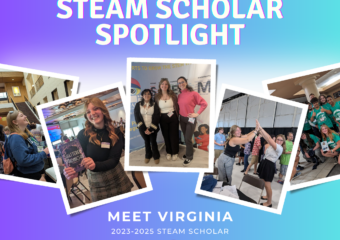The 5th Annual Project Fibonacci STEAM Leadership Conference tackles climate – Bruce Rosenbaum invited as special workshop presenter and keynote speaker for opening ceremony. A recurring theme in Bruce’s Steampunk art is Janusian (or opposite) thinking to creatively solve problems. Named after the Roman god Janus who had two faces looking in opposite directions, Janusian thinking involves the ability to simultaneously hold two opposing ideas or perspectives in one’s mind and find a solution that reconciles the contradictions. This type of thinking could be helpful in solving complex challenges like climate change by promoting creative and innovative approaches.
So, it was naturally a fitting concept to bring to this year’s STEAM scholars whose week in Rome, NY was focused on the theme of adapting to climate change and sustainability as it applies to protecting the planet, its oceans, and the global population. STEAM scholars are conference attendees who immerse themselves in an impactful theme presented by Project Fibonacci – hearing firsthand from experts and educators who are well versed in a particular field of study. The 2023 conference was held from
July 23 – 29.
“It was a pleasure to have Bruce’s insights and perspective on our topic this year,” said Tamalin Martin, Conference Co-Chair for The Project Fibonacci® Foundation. “With so many intense, academic presenters, we found bringing the artistic element of Steampunk was refreshing – and helped everyone think outside of the box.” Bruce created this year’s special workshop to demonstrate how Steampunk art can fuse facets of STEAM with history, invention, and innovation.
After tying Steampunk in with the concept of using divergent thinking to creatively solve small and large scale (climate change) problems, STEAM scholars worked in teams to design and build a self-sustaining natural vertical garden integrating a mechanical solar powered ‘Sunflower’ that can pump water to the garden’s plants and foliage. The Janusian “challenge” presented to the teams was twofold: First, the need to address climate change by increasing carbon capture – represented by the plants which naturally absorb carbon from the atmosphere. And second, to reduce the use of fossil fuels – addressed by the use of renewable solar energy to run the irrigation system. Throughout the process, teams were encouraged to embrace the contradictions, explore diverse viewpoints, and combine opposing solutions if possible. As a result, this approach helped to foster collaboration between STEAM scholars.
Read the full ModVic newsletter here: STEAMPUNKINETICS Workshop Shows STEAM Scholars How to Creatively Address Climate Change Issues by Designing Sustainable, Solar-Powered Vertical Gardens | Modvic











